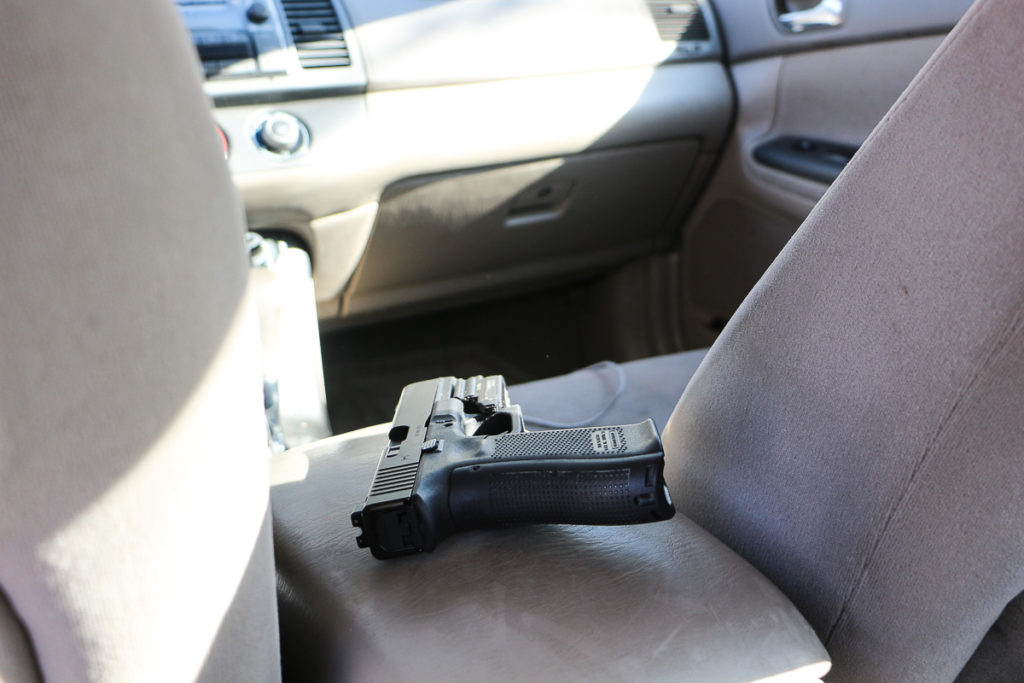
Maricela Morales lives in a small apartment in South Nashville. Decorations on her white walls are sparse, which makes the photo hanging in the middle of her living room seem even more prominent.
In Spanish, she describes the teenage boy in the photo, wearing a red polo shirt with black spiky hair. The picture has been blown up so large that it’s pixilated.
She pauses in front of the image, holding her hand up to it.
She starts to cry, saying, “Mi hijo.” My son.
She remembers Joseluis as an incredibly thoughtful boy. The two of them would cook together, and sell fruits and tamales. Morales has lost much of her eyesight because of diabetes, but Joseluis always took care of her, helped her.
Her life changed drastically when he died.
She can’t cook by herself anymore, can’t sell food to help pay for her rent or the surgeries she needs. She says her heart is broken, and she feels very alone.
“A esas mamas que tienen sus hijos, que los cuiden porque una pérdida de un hijo duele mucho,” she says. “Muchísimo.”
She warns other mothers to protect their children, because losing one hurts so much.
On the night Joseluis died in 2018, he was out with other teenagers from his school. Some of them were “car hopping” — trying the handles of unlocked cars in an apartment complex parking lot.
Sixteen-year-old Jazmine Wheeler was there, and she found a gun. They all got back in the car — Joseluis in the front seat, and Jazmine and another friend in the back.
“All I remember is playing with it,” she says. “I was playing with one, and a friend of mine was playing with one, and I just remember it went off.”
She says the sound was deafening. She jumped out of the car, confused, shocked.
She looked back inside and saw that Joseluis had been shot in the head.
The bullet had come from the gun that was in her hands.
She started screaming.
“I couldn’t fathom that I had just shot someone,” she says.
The juvenile court judge determined there was no evidence that Jazmine intended to shoot Joseluis. She was charged with criminal homicide and handgun possession but pleaded to a lesser charge. She spent three years in juvenile detention.
Making a profit off stolen guns
That was the last time Jazmine car hopped. But it wasn’t the first.
It started when she was only 14.
“The first time I found a gun in the car was actually the first night I ever car hopped,” Jazmine says. “It was that easy.”
After a while, she started selling the guns she found in cars to other kids or to adults.
“A common gun I sold a lot would be the Smith & Wesson 40,” she says. “For that — depending on what age group I sell it to — would be about three to five hundred dollars.”
Jazmine admits that she’d use some of the money to buy herself drugs, like cocaine. But she says she wasn’t stealing just for herself. Her mom was struggling with addiction, and she has two younger siblings. So she’d spend some of it on taking care of them.
“Food, clothes, things that they’d like,” she says. “Doing all the illegal stuff, I’d do it a lot if they had a field trip or something coming.”
Jazmine says car hopping became a reliable source of income.
Lots of kids knew how easy it was to find guns in unlocked cars.
 Paige Pfleger WPLN News
Paige Pfleger WPLN NewsGuns stolen out of cars in Nashville hit a record high last year. The police department says often, people are not locking their cars or securing their firearms in a lockbox.
A preventable crime
Juvenile Judge Sheila Calloway says Nashville gun owners are making it too easy.
“Don’t leave your weapon on the console of your car with your car door unlocked with the keys in your car,” Calloway says. “That’s when my youth – who are not on the top of their game in their thinking process and literally in the midst of their risk-taking process – are taking a risk.”
As Tennessee has loosened its gun laws in recent years, Calloway has noticed a trend: More kids have been coming into her courtroom facing charges of illegally possessing firearms.
That number did plummet last year, but Calloway says that’s probably because of diversion programs in schools, the police department and the court. Another possible factor is that Nashville police disbanded their juvenile crime task force.
But she says regardless of why they’re seeing the drop, this problem could be eradicated altogether if adults with guns practiced better firearm safety.
“It’s heartbreaking when I see youth that come through our system that literally, if we as a community had simply locked our car doors, kept the keys with us and locked our guns in safe places, that these cases wouldn’t be down here,” she says.
Fewer kids might get caught up in the system, or even die, because of access to easily stolen guns.
[hearken id=”wpln/8982″]

